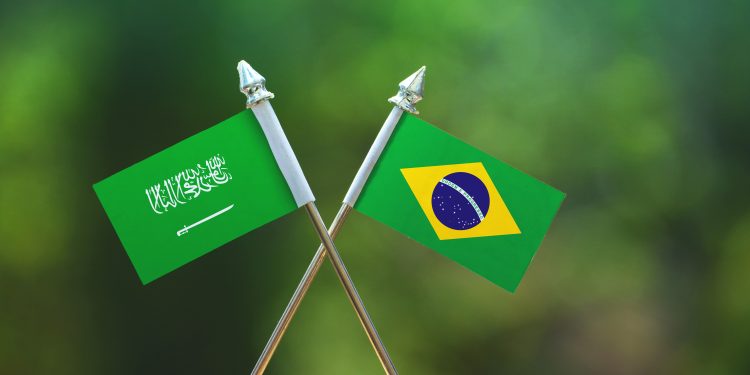Separated by vast distances, the arid landscape of Saudi Arabia and the verdant expanses of Brazil are drawing closer on the economic front. Their evolving partnership, originating from poultry trade in the 1970s, is now a strategic move to diversify trade relations and buffer against geopolitical volatility.
While the US and China remain major trading partners for both nations, Saudi-Brazilian trade reached approximately $7 billion last year. Projections by the Gulf Research Center suggest that this figure could escalate to $10 billion by 2030, as the nations continue to deepen their ties.
Brazil’s BRF SA, among the top poultry suppliers globally, is poised to open a new facility in Saudi Arabia, potentially marking its first foray into local chicken production, as per sources familiar with the developments. Additionally, aircraft manufacturer Embraer SA has joined forces with Saudi Arabia to bolster its aerospace sector.
This week, a Rio de Janeiro-based institute, supported by Saudi Arabia’s Public Investment Fund (PIF), will host its inaugural investment conference focused on Latin America. The conference will witness the gathering of prominent figures including Brazilian President Luiz Inacio Lula da Silva, Finance Minister Fernando Haddad, and PIF Governor Yasir Al-Rumayyan, alongside industry leaders from various sectors.
The conference aligns with Crown Prince Mohammed bin Salman’s ambitious economic transformation plans, which aim to diversify the oil-rich nation’s interests into various sectors including tourism, manufacturing, and sports. Goldman Sachs economist Farouk Soussa remarks that strengthening ties with Brazil reflects a strategic positioning of the Global South as a counterbalance to Western dominance.
Saudi Arabia’s quest for foreign investment to realize its ambitious economic goals has led to a global outreach for funds. The kingdom is actively allocating significant portions of investment opportunities, such as the Saudi Aramco stock sale, to international investors.
With the upcoming Rio conference, attention shifts to Latin America’s largest economy. According to Soussa, Brazil’s complementary industries, particularly in food security and metals, make it a vital ally for Saudi Arabia.
The partnership extends to the mining sector, with the Saudi-based Manara Minerals Investment Co. acquiring a 10% stake in Vale’s base metals unit. This move signifies Saudi Arabia’s entry into the global metals market, with more acquisitions anticipated as Manara seeks additional assets.
For President Lula, the potential influx of Saudi investment is a welcome boost to Brazil’s economic expansion efforts. During his visit to the kingdom, Lula emphasized Brazil’s future role as a major player in green energy.
Food remains the cornerstone of Saudi-Brazilian trade, with Brazil’s food exports to the kingdom reaching a decade-high in 2023. The kingdom has designated Brazil as its strategic food sector partner, primarily through PIF and its subsidiary, Saudi Agricultural and Livestock Investment Co. (Salic).
Salic’s investment in BRF and its position as the largest shareholder in meat producer Minerva SA, along with a substantial supply contract, solidify this partnership. Additionally, Brazil’s return to the fertilizer market, potentially with a Saudi partner, further cements the economic relationship.
The defense sector also sees collaboration with a five-year agreement between Brazil and Saudi Arabia that includes military systems technology transfer. Embraer is in discussions for aircraft deals with Saudi Arabia and considering a new production center in the region.
With Vision 2030 in full swing, Saudi Arabia is actively seeking Brazilian expertise and investment in infrastructure, hospitality, housing, and entertainment. BTG Pactual SA, having established a presence in Riyadh, sees the kingdom as a land of opportunities for problem-solving and investment.
In a reciprocal investment drive, firms such as Claure’s and Patria Investments Ltd. are both seeking Saudi investment and looking to channel Latin American capital into the kingdom. Patria CEO Alexandre Saigh emphasizes the bilateral exchange of capital as a key component of the relationship.
While Saudi investment in Brazil currently exceeds Brazilian investment in the kingdom, the Arab-Brazilian Chamber of Commerce anticipates a more balanced flow in the future. Hannan Alghamdi of the Gulf Research Center suggests that while the potential exists, significant Brazilian foreign direct investment in Saudi Arabia may still be a few years away.


